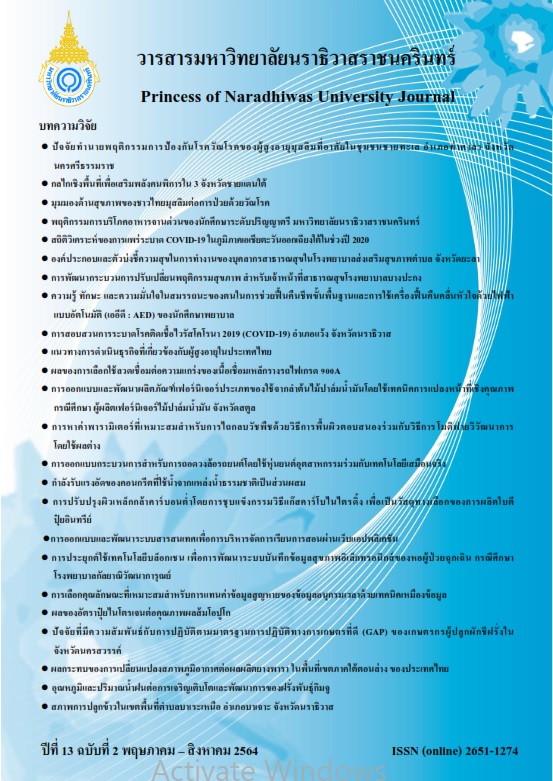กำลังรับแรงอัดของคอนกรีตที่ใช้น้ำจากแหล่งน้ำธรรมชาติเป็นส่วนผสม
คำสำคัญ:
กำลังอัดคอนกรีต, แหล่งน้ำธรรมชาติบทคัดย่อ
โครงการวิจัยนี้มีวัตถุประสงค์เพื่อศึกษาผลกระทบของกำลังอัดคอนกรีตที่ใช้น้ำจากแหล่งน้ำธรรมชาติในอำเภอเมือง จังหวัดนราธิวาส เป็นส่วนผสมเพื่อเปรียบเทียบกำลังอัดคอนกรีตที่ใช้น้ำประปาส่วนภูมิภาคเป็นส่วนผสมโดยการทดสอบหาค่ากำลังรับแรงอัดของแท่งคอนกรีตรูปทรงกระบอก ขนาด Ø-15 เซนติเมตร และสูง 30 เซนติเมตร น้ำที่ใช้ผสมคอนกรีตที่มาจากแหล่งน้ำธรรมชาติจำนวน 5 แหล่งประกอบด้วยน้ำจากแม่น้ำบางนราฯ น้ำจากคลองยะกัง น้ำจากบ่อบาดาล น้ำจากบ่อน้ำตื้น น้ำประปาส่วนภูมิภาค โดยระยะเวลาในการศึกษา เดือนกุมภาพันธ์ ถึง เดือนพฤษภาคม 2562
ผลจากการทดสอบกำลังอัดคอนกรีตที่ออกแบบส่วนผสมให้มีกำลังอัดเท่ากับ 200 กก/ซม2 อายุการบ่มที่ 28 วัน พบว่ากำลังรับแรงอัดคอนกรีตเฉลี่ยของน้ำจากแหล่งน้ำธรรมชาติเป็นส่วนผสมเท่ากับ 252 กก/ซม2 กำลังอัดคอนกรีตเฉลี่ยของน้ำประปาเป็นส่วนผสมเท่ากับ 271 กก/ซม2 และกำลังอัดลดลงที่ร้อยละ 7 เปรียบเทียบกับกำลังอัดที่ใช้น้ำประปาเป็นส่วนผสมกำลังอัดคอนกรีตที่ 250 กก/ซม2 อายุการบ่มที่ 28 วัน พบว่ากำลังรับแรงอัดคอนกรีตเฉลี่ยของน้ำจากแหล่งน้ำธรรมชาติเป็นส่วนผสมเท่ากับ 291 กก/ซม2 กำลังอัดคอนกรีตเฉลี่ยของน้ำประปาเป็นส่วนผสมเท่ากับ 303 กก/ซม2 และกำลังอัดลดลงที่ร้อยละ 4.04 เปรียบเทียบกับกำลังอัดที่ใช้น้ำประปาเป็นส่วนผสมกำลังอัดคอนกรีตที่ 300 กก/ซม2 อายุการบ่มที่ 28 วัน พบว่ากำลังรับแรงอัดคอนกรีตเฉลี่ยของน้ำจากแหล่งน้ำธรรมชาติเป็นส่วนผสมเท่ากับ 330 กก/ซม2 กำลังอัดคอนกรีตเฉลี่ยของน้ำประปาส่วนภูมิภาคเป็นส่วนผสมเท่ากับ 331 กก/ซม2 และกำลังอัดลดลงที่ร้อยละ 0.30 เปรียบเทียบกับกำลังอัดที่ใช้น้ำประปาเป็นส่วนผสมคอนกรีต
เอกสารอ้างอิง
Building Products and Materials Co. Ltd. (2000). Stone, Sand and Concrete Test Guide. (3rd Ed.) Bangkok. (In Thai).
Chatveera, B., & Daram, S. (2009). Effects on Concrete Mixing Additives from Using Salad Dressing (sludge Water) from ready-mixed concrete plants.
SCG Cement Co. Ltd. (2008). Cement and its applications. (4rd Ed )Bangkok. (In Thai).
Sethabutra, C. (2004). Concrete Technoiogy. (3rd Ed). Bangkok. (In Thai).
Srichan, T. (2011). Effect of curing on concrete compressive strength using type cement. And binders
Tangjiraphat, W., & JaturPitakkul, C. (2013). Guide to Testing the Properties of Cement, Aggregates and Concrete. The Engineering Institute of Thailand In patronage, Bangkok




